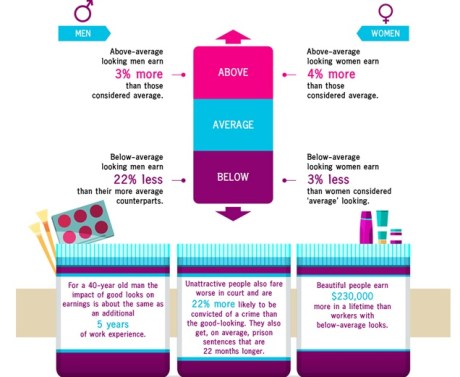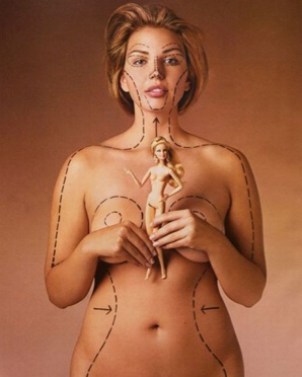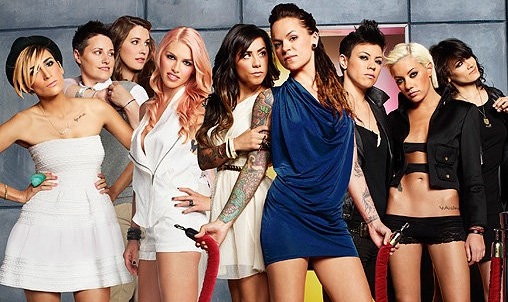Yesterday, Jezebel released an infographic by Feel Unique, an online beauty retailer, titled “Beauty Vs. Happiness.” The infographic seeks to answer questions like, “Is beauty the road to happiness? Are those of us who spend big on cosmetics any better off than the rest? Can good looks improve your satisfaction with life?”

According to the study, the United States spends more on cosmetics than any other country — $38.698 billion dollars in 2007 — and has the highest percent of cosmetic surgery procedures worldwide at 17.9%. And according to the Satisfaction With Life Index, the US ranks 23rd in overall life satisfaction.
The study differentiates between those who spend a lot of money on cosmetics and those who are “born beautiful,” helpfully letting us know that the top 15% of people ranked by looks are over 10% happier than people ranked in the bottom 10% of looks. And therefore happiness correlates to income, as the study tells us, because apparently above-average looking women earn 4% more than those considered average, while below-average women earn 3% less than women considered average looking.

Last week, I wrote about a 14-year-old girl who got plastic surgery to fix the parts of her face that she was bullied about. According to this study and the correlation between cosmetic surgery and happiness that it shows, she might not be more happy because of it. But then again, correlation doesn’t prove causation, so who knows.
There are several things we should take from the study, and many more things we should not. First of all, I’m just going to go ahead and say that I don’t believe that “beautiful” is a Real category that can be tracked and turned into statistics. Because clearly, what I find beautiful is probably not what the people who run the world find beautiful, otherwise successful models would mostly be queer women with short hair, strong shoulders and big hearts (a girl can dream) and no one would say mean things to my girlfriend on the subway. The study claims that beautiful people make more money than not beautiful people, but last time I checked, dykes still make less than cis-men. What do you all find beautiful? Do you feel like your vision of beauty is accounted for in studies like this one?
The study seems to be saying that no matter how much money you spend on cosmetics, if you aren’t born beautiful, you aren’t going to benefit from the life perks that naturally beautiful people receive. In the universe of this infographic, the world has a keen sense of who naturally fits into its standards of beauty, and who is faking it. And the people who are faking it will never be welcome into the club, no matter how much cash they drop trying to buy their way in.
Mainstream culture does definitely have its own standards of beauty that it tries to force on the rest of us, and the cosmetics industry’s very existence relies on people striving to achieve that aesthetic. Because if we are told over and over that beautiful people are more happy, more successful, and generally more valuable to society, what’s not to strive for? It’s a lose/lose for anyone who doesn’t fit the paradigm, because beauty, according to this, is not something you can really attain. You either have it or you don’t. And if you don’t, but have fallen victim to the myth of unattainable yet enforceable beauty standards, you can bring your entire paycheck straight to Sephora every payday but you probably won’t ever be satisfied with your life. In fact, maybe it’s the act of striving to attain someone else’s version of beauty that leads to dissatisfaction, rather than simply not fitting that standard.
But is the cult of beauty something that queers should be striving to be part of? Before the media began to represent queer people, we were free to have our own standards of beauty, un-policed by the mainstream. But inevitably, as we gain more rights and more representation, we assimilate. And as we assimilate, we are expected to shed our gorgeous, special snowflake unicorn selves and conform to the aesthetic standards forced upon straight people, because, you know, everyone’s equal now and whatever. And that’s why there’s a show on television that claims to be “Real” about tall and slender queers with perfect skin and tiny noses and designer clothes, looking like they just stepped off a runway no matter how hungover they are.

I don’t want to have to tailor my life to fit an infographic about the relationship between beauty and happiness. Like, the fact that my leg hair grows in golden and soft makes me feel attractive and quite pleased with myself, but that doesn’t mean I’m about to get a high paying job because of it. It is someone else’s definition of beauty that counts for that sort of thing. So I suggest we stop trying altogether, and go back to celebrating our personal standards of beauty instead. I doubt we’ll start to get richer, but I promise you we’ll be happier.








Comments
I raise my middle finger up in the air. Try that “infographic” for size. HOW DO YOU LIKE ME NAO?!?!? *smirk*
Okay, good article premise. One little critique from a social scientist here though: the sources should be careful about confusing correlation with causation. The US ranking 23rd in life satisfaction might be better correlated with income inequality…
otherwise YAY AUTOSTRADDLE HURRAH
I was kind of wondering about this comparison myself.
I’d be curious to know how they come up with the “data” presented in this infographic, since someone’s “degree of beauty” isn’t legally or officially signaled anywhere the way gender or ethnicity are.
Like, did they contact company owners and judges to ask them for data on the salaries and prison sentences they give out along with how much they’re attracted to the concerned people? Or did they asked employees and people who went to court about their experiences, and then ranked their looks based on… on what?
Everything about this is just bogus.
“Because clearly, what I find beautiful is probably not what the people who run the world find beautiful, otherwise successful models would mostly be queer women with short hair, strong shoulders and big hearts (a girl can dream) and no one would say mean things to my girlfriend on the subway.”
Amen! If I could have all of that on every billboard that I’m forced to look at on my commute to work, I’d happily live with our culture’s appetite for marketing.
“What do you all find beautiful?”
Let’s see: nose studs, girls in waistcoats, girls in ties, girls in menswear in general. People comfortable in their own skin. People with cute ears. Easy smiles. The muscles in necks when people turn their heads. People who can quote poetry in regular conversation. Hipbones. Eyes that sparkle like they know a secret. Freckles. Scars that tell a story. Flaking nail varnish. I’m sure there’s more…
[…] The study claims that beautiful people make more money than not beautiful people, but last time I checked, dykes still make less than cis-men. What do you all find beautiful? Do you feel like your vision of beauty is accounted for in studies like this one?Find out more from Autostraddle […]
the rest of the world and its standards for “beauty” is really missing out, as far as I’m concerned. The things that are beautiful to so many people of all backgrounds are just skipped over because they don’t fall into the “skinny, blonde, flawless” category. people forget about all the wonderful things like collarbones and women in ties and curves. women are such special snowflakes! why just choose one or two kinds when you can have all the great and beautiful things about all of them?
Blah. I find studies that try to rate emotions or aesthetics or whatever are usually silly.
Yeah, I buy a lot of make up but that doesn’t mean I’m wearing it everyday or think I need it. Sometimes I roll out of bed and like my face as is. Also, I just like having various tools at my disposal to make me look like a mermaid or a lizard queen.
This is totally unrelated to the article, but why is whitney in a dress in that picture? She looks very uncomfortable.
I still having a “whaaa?” with that.
Still.
another question that could be posed is, why is amanda in lingerie and a jacket? they’re not outside clothes!
I remember Tyra Banks had an episode like this once. Although I think it was more about being overweight than “ugly” or maybe it was being blac vs. white. Either way, she disguised herself as two opposite looking people and went to the same interview for a job as each person. Obviously, her experiment proved that the prettier, white, thinner version of herself got better remarks from the interviewer than the overweight, ugly, darker skinned version. Ahhh Tyra…
On another note, one day about two years ago, I decided that I was no longer going to put up with wearing make up. It’s sticky, makes a mess, makes me look too air brushed, and gave me more acne. I stopped trying to cover up what I considered my flaws, and began a committed regimen of face washing, toning, and moisturizing. I feel like my skin is healthier, loves me more, and people compliment me more off of my natural beauty rather than make-up beauty. That’s my suggestion to women who are struggling with fighting the media’s constant nag that they aren’t beautiful enough. I don’t mind some mascara or eyeshadow now and then, but it feels like my skin and therefore I, can breathe so much better now.
Oh yes. This is such an important thing to talk about I think, and especially pointing out that the assumptions in this article, like that there is one standard of beauty that all people can recognize and appreciate, are just that, assumptions. And for the record, I also love the way my leg hair grows in blonde and soft and slightly curly. I think it’s pretty.
Probably being beautiful does make you more successful, but buying and wearing makeup doesn’t make you beautiful.
If you take an ugly person and put makeup on them, do you get a beautiful person? No.
Confidence, health, enthusiasm, smiling; those things work a lot better.
[…] rather than allure does not make you a dyke. (I hope this conversation doesn’t get removed) Skipping makeup does not make you ugly. Refusing to go out with a guy, saying “No,” does not make you a cocktease or a bitch […]